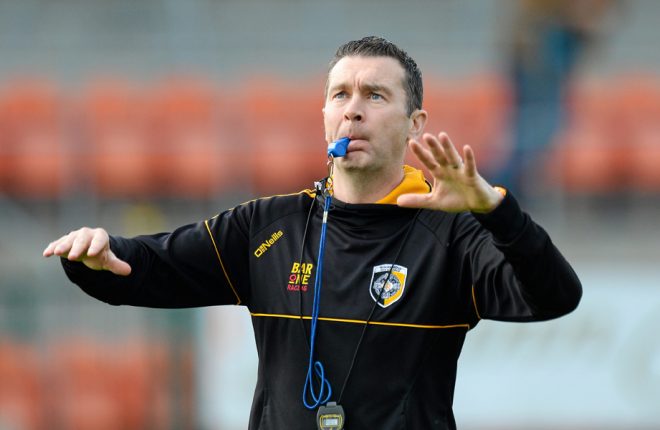
Oisin McConville worked on improving the strongest parts of his game
Peter Canavan and Oisin McConville’s ability to be always in the position to take a pass on the bounce, coupled with their excellent first touch and evasion skills, meant they could make sufficient space to stroke over a point.
I’m sure these strengths were constantly coached and also practised by themselves to produce their high percentage scoring return, which destroyed opponents by their skilled use of their strengths.
Neither was noted for their ‘high-catching’, but trying to ‘fix/solve’ this problem many have lessened their ability to score.
In essence, I’m advocating that building players’ strengths rather than trying to fix/problem solve unnecessarily perceived needed skills is a better way to create successful teams.
My take on coaching method is rather than a ‘if it’s not broke, don’t fix it’ approach adopt a ‘if it’s not broke, then make sure it doesn’t break’ approach.
Strengthen a player’s strengths and make stronger only the other skills needed to support their strengths in a game (done in a 3:1 ration of time spent).
It’s common in problem solving to focus on what’s missing in order to fix it. What’s missing is a hole, empty and so coach and coach is stuck.
The problems with problem solving are:
- 1. It deflates – Focusing on problems is draining. Problems de-energise players.
- 2. It Magnifies Weaknesses – Focusing on what is weak or lacking can actually magnify those weaknesses in the player’s mind and they start to doubt themselves and lose confidence.
- 3. It De-Values The Player – If a coach tends towards problem solving, they often take the player back through questions they’ve already considered. Doing so may indicate that the coach doesn’t think the player(s) are smart enough to have asked these questions on their own.
- 4. It Continues The Spiral – A problem centred approach often takes players around the same ‘blocks’ they’ve already seen. Players usually want their coach to bring a fresh approach.
- 5. It Focuses Only on the Here and Now – So this approach overlooks players’ life-long resources of strengths, talents and experience.
This negative approach can be turned around if the coach shifts their focus from the problem to the player.
Now the coach focuses on players’ strengths, talents and values and these can be worked on and added to.
Einstein said, “We can not solve our problems with the same level of thinking that created them.”
Coaching to improve a player’s strengths is a higher level of thinking and will likely be a new experience for the players.
Coaching ‘one-to-one’ is the greatest challenge to improve player’s strengths, for to do so a caoch must be on top of his game as they know players will not accept waffle.
Coaching strengths, one-to-one would be a new experience for many coaches.
If a coach does one-to-one this positive focus moves their players away from problem centred techniques and provides energy and drive for the players to improve/strengthen the strengths.
Here are four ways coaching strengths moves players forward:
- 1. Strengths Motivate – Strengths are naturally motivating and exciting to think about.
When coach turns the conversation to strengths, the difference in the player’s energy, motivation and excitement is raised and clearly seen and heard.
Now they just want to get up and do something. - 2. Strengths Reveal Sources – Focusing on weaknesses or skills not needed is like trying to work with a hole: it’s empty and deflating.
Shifting to strengths opens up a whole new arena of resources and building blocks that can be used to move players forward. - 3. Strengths Work Together – When coach/player looks at their own strengths and of all the players, they begin to see how they can combine everything to create better individual play and team play.
- 4. Strengths Alter Players’ Views of Weakness – eg, if a coach or player was bossy so much so that their leadership was hurting others, they can be taught or learn how their strength of ‘leadership’ could be used to be more welcome and useful to fellow players.
Often I name my team for players based on their greatest mental strengths, eg, confident, commanding, passionate, courageous, patient and when other players in games doubt themselves I tell them to look to team-mates and take heart from their ‘confidence, etc’ to inspire them to be the same.
Focusing on strengths empowers and energises both coach and players, solves problems yet develops them also as people. Watch them become much better players.
In one-to-one clinics, ask players about a game they excelled in.
Help them to discover what strengths they used to excel and work on these to improve their game even more.
Building strengths or solving problems? Well, it’s building strengths for me. Playing to them wins games.
Receive quality journalism wherever you are, on any device. Keep up to date from the comfort of your own home with a digital subscription.
Any time | Any place | Anywhere











